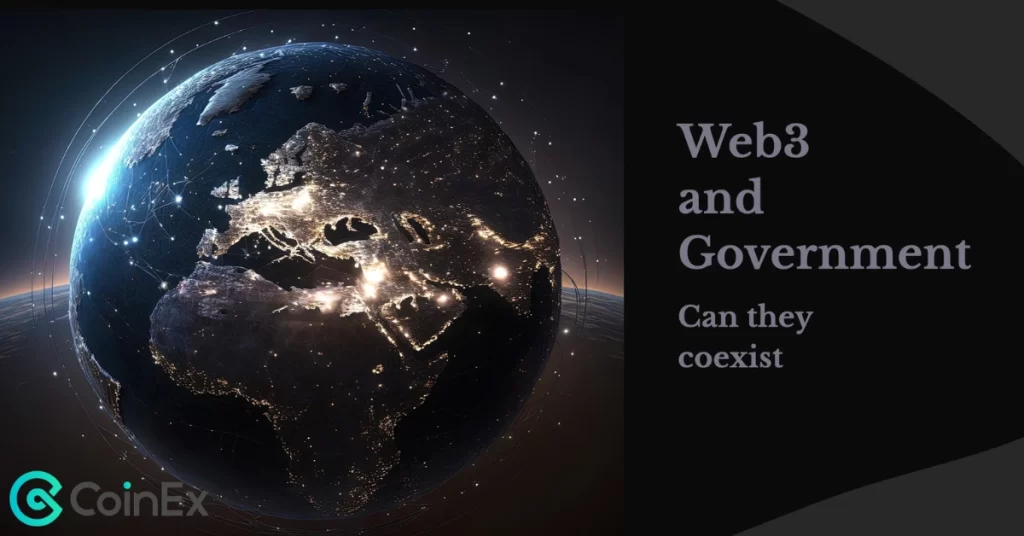
The post Balancing Act: Can Web3 and Government Regulation Coexist? appeared first on Coinpedia Fintech News
Web3 is transforming the internet as we know it, shifting our focus from centralized organizations to decentralized systems that prioritize privacy, security, and control. However, the question of whether government and regulation could impede the growth of Web3 remains an important debate among enthusiasts and skeptics alike.
Web3 technologies aim to empower individuals by eliminating the need for intermediaries, disintermediating activities, and enabling self-governance. The decentralized nature of Web3 technologies allows for greater freedom and democratic participation, which is a significant departure from traditional internet structures. However, as the space becomes more popular, concerns about illegal activities, consumer protection, and tax evasion have emerged, making Web3 a prime focus for government attention.
Government’s regulation: friend or foe?
Web3, or the decentralized web, is built on technologies such as blockchain, which are designed to operate in a decentralized, trustless environment. Unlike traditional web systems that are controlled by a few large entities, such as Google, Facebook, or Amazon, Web3 does not have a central point of control, offering enhanced privacy and security features for users to control their data and protect their identity. Additionally, Web3 protocols use encryption and anonymity techniques to keep data private and prevent unauthorized access.
The absence of traditional regulatory frameworks has made it difficult for businesses and individuals to navigate this space. Regulation can help provide clear guidelines and a level of certainty for developers, users, and other stakeholders within the Web3 ecosystem. It can promote transparency and accountability, protect the interests of consumers, and foster innovation by creating a safe and stable environment for technological advancement. Furthermore, regulation can help to attract institutional investors who require compliance with rules and regulations to ensure they are investing in a safe and secure manner. This can lead to increased capital flow to the industry, which can fund further development and growth.
However, government and regulation have traditionally been seen as threats to decentralized systems. They could slow down innovation and limit freedom of expression. It also means that government institutions could exercise control over the system, which goes against the principles of a decentralized framework.
Yet, it isn’t entirely fair to consider government and regulation as “friend” or “foe” to Web3 without weighing their potential advantages.
Hinder and advance
Government regulations can hinder the development of Web3 in several ways. Firstly, traditional regulatory structures are difficult to enforce due to the decentralized nature of Web3. Compliance with many regulations can be a major challenge for Web3 companies and startups due to the substantial costs and complexity of compliance. This can pose a significant barrier for smaller entities and lead to legal uncertainty and increased risk for businesses.
Moreover, regulatory uncertainty can hinder the growth and development of the industry when regulations are unclear or continuously changing. This creates doubt among businesses, investors, and users, leading to a lack of confidence in the industry, which can stifle growth and development. Excessive regulation that limits developers’ freedom to experiment and innovate can also create a risk-averse environment, further hindering the growth of Web3. Therefore, it is crucial for governments to take a balanced approach to regulation, focusing on protecting users while also fostering innovation.
Decentralized exchanges (DEXes) such as Uniswap have adapted to these regulations and are undergoing processes to improve their compliance. Centralized exchanges, such as CoinEx, are making efforts to comply with local governmental regulations as they strive to become the infrastructure of the blockchain world and the entryway for ordinary investors to the Web3 ecosystem. To ensure that its users’ safety and protection is given the utmost importance, it has established a robust and specialized team of compliance and risk control experts. Furthermore, the company is proactively seeking to acquire more compliance licenses, to ensure full compliance with regulatory measures and maintain the highest standards of security in the industry.
In summary, government and regulation are both opportunities and threats to the development of Web3. While they could restrict and impede Web3’s growth, it is vital to consider the positive potential of these entities. The key is finding the right balance between innovation and regulation, so that the benefits outweigh the drawbacks. The future of Web3 may, in fact, depend on how the industry deems it necessary to engage with regulatory authorities while retaining its original vision of an open, transparent, and decentralized internet.

 2 years ago
174
2 years ago
174














 English (US) ·
English (US) ·